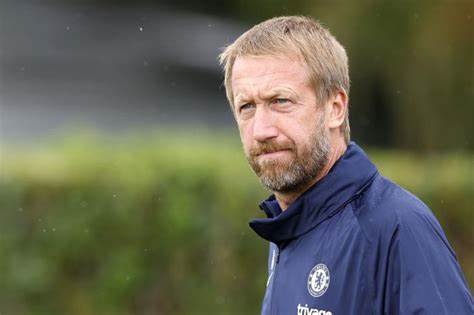By Theo Gardner
Graham Potter joined Chelsea as manager on the 8th of September 2022, following the sacking of Thomas Tuchel. Since then, Potter has a win rate of just 29.4% within the Premier League – a far cry from Thomas Tuchel’s win rate of 55.6%.
Despite Potter’s impressive managerial history and rise from Leeds Metropolitan University to the Premier League, many fans disagreed with the sacking of Tuchel – especially due to Tuchel’s Champions League success in the 2020/21 season.
At the time of writing, Chelsea sit 10th in the Premier League, after losing to last-placed Southampton on the weekend.
This has led to many Chelsea fans calling for the sacking of Graham Potter just 5 months after his arrival at the club, and while the Chelsea board are backing the manager for now, the question remains whether or not the club should part ways with him.
What has gone wrong?
So, what has gone wrong for Potter at Chelsea?
Last week’s Champions League game against Borussia Dortmund offered an apt summary of Potter’s time at the London club. In the second half in particular, Chelsea took control of the game. Dominating the ball and creating the lion-share of chances. Overall, Chelsea created 8 shots on target and an xG of 2.13 goals. In comparison, Dortmund created only 2 shots on target and had an xG of 1.41 goals (Sky Sports).
Chelsea were hit on the counter by Karim Adeyemi and did not utilise the chances they themselves created – resulting in a 1-0 loss. This was indicative of Potter’s tenure at Chelsea. Within the Premier League, Chelsea have one of the worst xG to actual goals converted rates – scoring -0.57 times less than their xG suggests they should be per 90. Only two clubs are performing worse within this category – Wolverhampton Wanderers and West Ham United.
This naturally points to Chelsea’s striker issues. Chelsea do not have an elite-level striker. In the summer they signed Aubameyang in an attempt to solve this, however this has not worked out for a multitude of reasons and he was even left out of their Champions League squad following the January transfer window. Armando Broja had an impressive year out on loan last season, however he has spent much of his time back at Chelsea injured and even if not for this, he is not yet a top-level Premier League striker. Similarly, despite the recent signing of David Datro Fofana, this has not been a solution. Fofana is only 20 years old and despite signs of a bright future, it would be hard to argue that at this current point in time he is the answer to Chelsea’s number 9 problems.
Chelsea have often turned to Kai Havertz to take up the number 9 role under both Potter and Thomas Tuchel, however this is not his natural position and despite the ability to be functional in this role, he cannot perform to his full ability playing here.
However, it runs deeper than this.
When joining the club, Potter initially implemented a 3-5-2 formation, adopting a very fluid system both in and out of possession. However, more recently Potter has instead opted for a much more rigid 4-2-3-1 formation with a double pivot in midfield. Under this formation change, Chelsea have been performing better according to the underlying statistics. Their xPts sits considerably higher than their actual points, implying some significant bad luck for Potter during his tenure (FootyStats).
It is possible that Chelsea have switched to this more simple and familiar formation as a result of the sheer number of players they signed in January and the limited time to embed them into the squad, however, this more rigid style of football is completely opposite to how Potter has set his teams up throughout his whole managerial career.
This means that to cope with becoming the Chelsea manager mid-season, alongside the lack of familiarity his squad has with one another, Potter is subverting from his favoured tactical set-up in order to attempt to get the best out of his players at present. It is likely that Potter would start to re-incorporate his tactical style if given the time to – especially with a pre-season outside of the normal Premier League season. If given this time, we can expect Chelsea to start to perform better (based upon his previous managerial success). Indeed, there is a wealth of examples of clubs performing well once the manager has been given time to fully embed their tactical ideology into the club. For instance, Mikel Arteta recorded an 8th placed finish in his first season at Arsenal. A relatively low finish for a club with such a rich history, especially considering how well they have performed this season. Similarly, Klopp also recorded an 8th placed finish in his first season as Liverpool manager. Since then, it is undeniable that Klopp has experienced huge amounts of success – winning the Premier League, the Champions League, the Super Cup, the Club World Cup, the FA Cup and the Carabao Cup.
The evidence would suggest that given the time to embed his tactics into the clubs and familiarise the player’s with his system, Potter would be able to fully implement his tactical set-up as he wants to and this should yield stronger results.
INJURIES
The other major influence throughout Potter’s tenure has been injury problems. Since his appointment, Potter has dealt with injuries to a number of key players. These include: Fofana, Chilwell, James, Kante, Sterling, Pulisic and, Broja. This of course is another disadvantage to Potter – he not only cannot play what he sees as his strongest line-up, but also may have to alter his tactical plan due to the personnel he has available to him.
CONCLUSION
Overall, managers need time to implement their tactical ideas. Particularly in the modern game, it would be absurd to expect a manager to come in and have their players instantly performing perfectly within their tactical plan. Potter is not exempt from this.
There is no guarantee that Chelsea will experience success under Graham Potter, however he should be given the time to implement his ideas fully. Currently, it would be impossible for the Chelsea players to do his tactics justice, due to the lack of time they have had under him – particularly those signed in January. As a result, Potter has gone as far as to play a completely different style than he has favoured throughout his career in an attempt to account for this.
Potter’s managerial history showcases the strength of his system and given more time with his players, alongside a pre-season, there is no reason to suggest this wouldn’t be the case at Chelsea.
Terminology –
xG = Expected Goals
xPts – Expected Points



